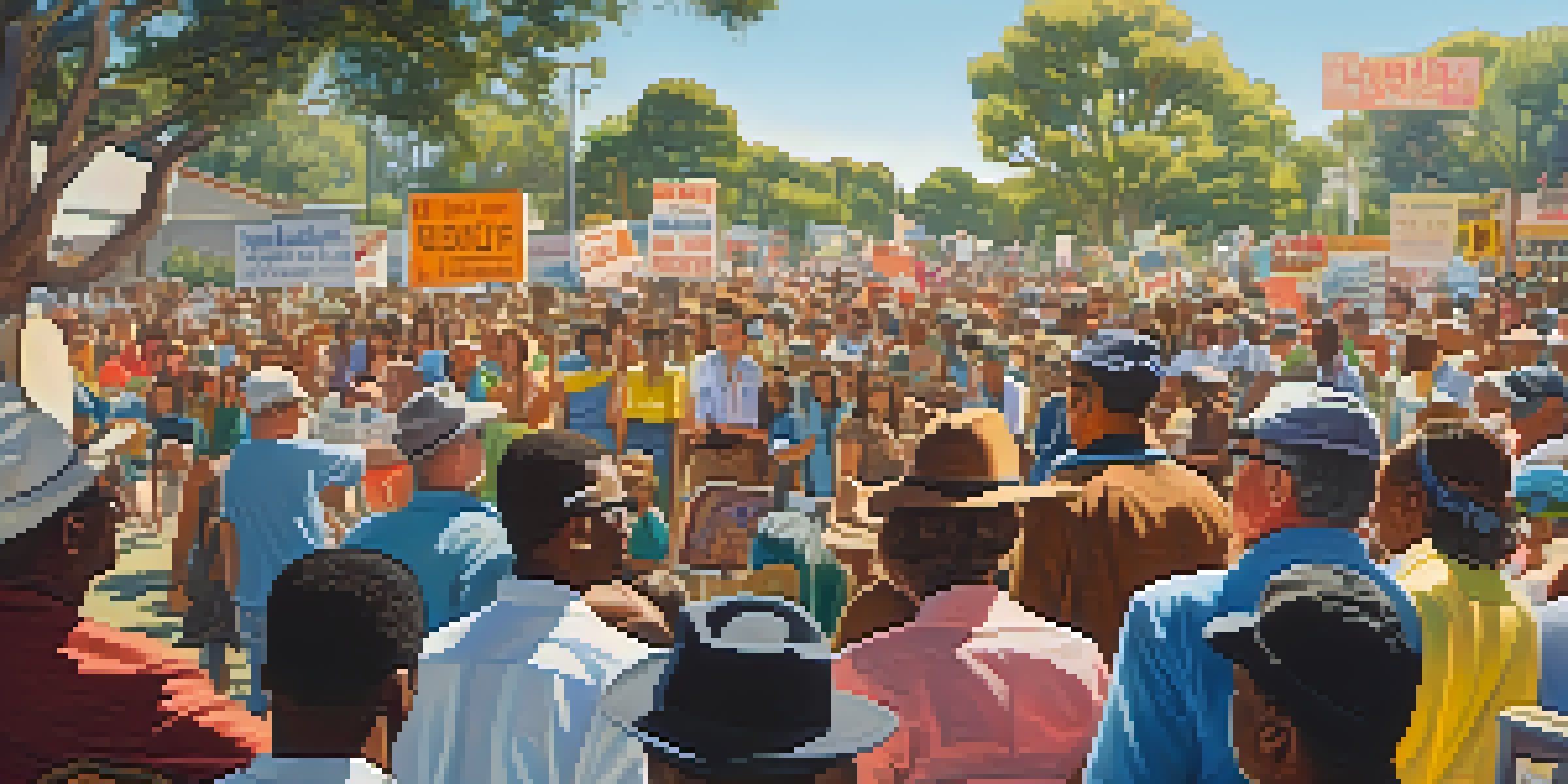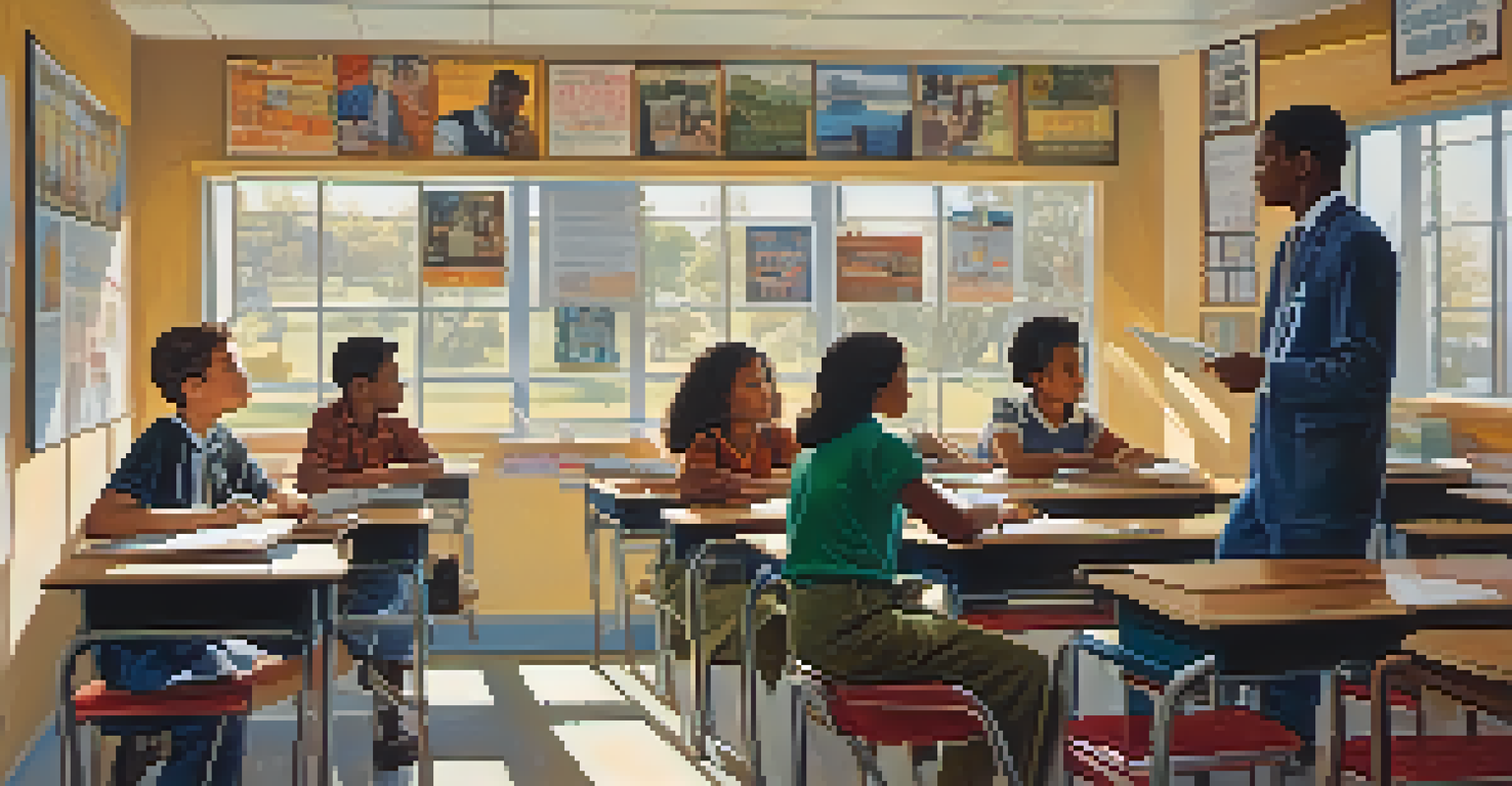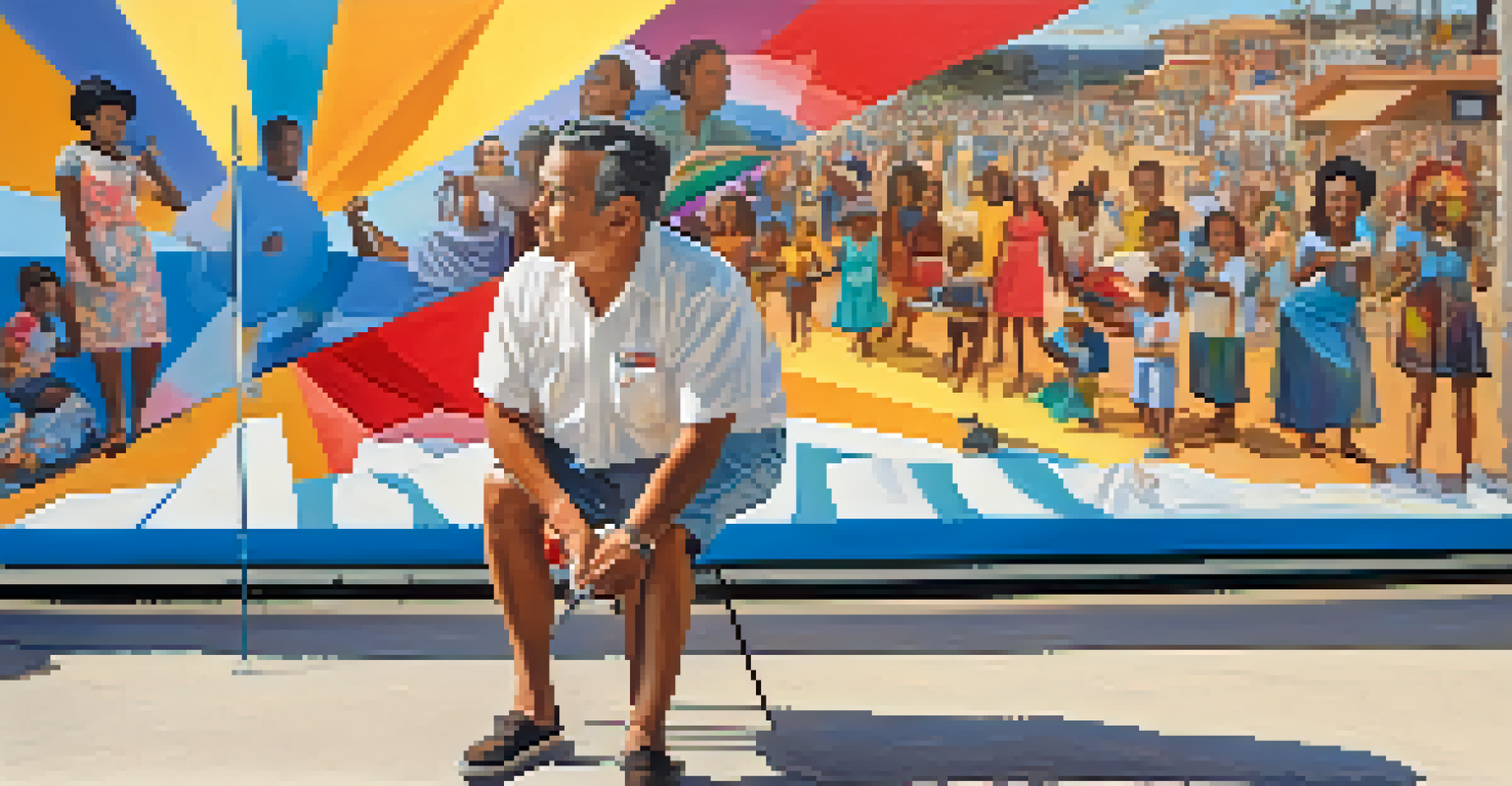Carlsbad's Contribution to the American Civil Rights Movement

The Historical Context of Carlsbad in the 1960s
In the 1960s, America was embroiled in the Civil Rights Movement, a pivotal time marked by the struggle against racial segregation and discrimination. Carlsbad, a small city in California, played its part during this transformative era. While not as widely recognized as larger cities, Carlsbad's local initiatives contributed to the broader national dialogue on civil rights.
Injustice anywhere is a threat to justice everywhere.
The community was home to various grassroots organizations aimed at fostering equality and justice. Activists in Carlsbad sought to address local issues, such as school segregation and discriminatory practices. Their efforts were often in harmony with national movements, illustrating how local actions can ripple through the larger fight for civil rights.
Understanding Carlsbad's historical context helps us appreciate the nuanced role of smaller communities in the Civil Rights Movement. While the spotlight often shines on major cities, towns like Carlsbad provided essential support systems that challenged injustice and advocated for change.
Key Figures in Carlsbad's Civil Rights Efforts
Every movement has its champions, and Carlsbad was no exception. Local leaders emerged, driven by a passion for justice and equality. These individuals organized protests, community meetings, and awareness campaigns that mobilized residents and inspired change.

One notable figure was a local teacher who initiated programs to educate students about civil rights issues. By promoting understanding and compassion among young people, this educator played a crucial role in fostering a new generation of advocates. Their efforts exemplified how education can be a powerful tool in the fight for social justice.
Local Activism Shaped Civil Rights
Grassroots movements in Carlsbad mobilized residents to address racial inequalities through community organizing and activism.
The contributions of these key figures remind us that change often begins at the grassroots level. Their dedication and courage not only influenced Carlsbad but also contributed to the national narrative of the Civil Rights Movement.
Grassroots Movements and Community Activism
Grassroots movements were vital in shaping Carlsbad's contributions to civil rights. Residents banded together to form coalitions that addressed racial inequalities in housing, education, and employment. These local efforts exemplified the power of community activism in effecting change.
The time is always right to do what is right.
For instance, residents organized marches and rallies, drawing attention to discriminatory practices within their city. These events not only raised awareness but also galvanized support from neighboring communities, showcasing how a united front can amplify a message. The participation of diverse groups highlighted the shared commitment to justice and equality.
Through grassroots activism, Carlsbad's residents demonstrated that every voice matters in the ongoing struggle for civil rights. Their collective actions serve as a testament to the impact of community engagement in shaping a more equitable society.
Education as a Catalyst for Change in Carlsbad
Education emerged as a crucial component of Carlsbad's civil rights efforts. Schools became focal points for discussions about equality, tolerance, and the importance of understanding diverse perspectives. Local educators recognized the need to address racial issues within the curriculum.
Initiatives such as inclusive history lessons and cultural awareness programs helped foster a more informed student body. By creating an environment where students could learn about the civil rights struggle, educators empowered the next generation to advocate for justice. This focus on education played a significant role in shaping community values.
Education Empowered Future Advocates
Local educators played a crucial role in promoting civil rights by incorporating inclusive lessons that inspired students to advocate for justice.
Ultimately, Carlsbad's commitment to education as a means of promoting civil rights illustrates the profound impact that knowledge can have on social change. By educating young minds, the community laid the groundwork for a future where equality is not just an aspiration, but a reality.
The Role of Local Government in Civil Rights
Local government plays a pivotal role in advancing civil rights, and Carlsbad was no different. City officials and community leaders collaborated to address pressing issues related to discrimination and inequality. Their willingness to engage with activists highlighted the importance of having supportive structures in place.
In response to community pressure, Carlsbad's government implemented policies aimed at promoting inclusivity and protecting the rights of all residents. These initiatives included anti-discrimination ordinances and programs designed to support marginalized communities. The local government’s proactive stance demonstrated a commitment to fostering a more equitable environment.
This partnership between local activists and government officials underscores the significance of collaboration in the quest for civil rights. Carlsbad's experience exemplifies how local governance can be an ally in the fight against injustice.
Cultural Contributions to Carlsbad's Civil Rights Movement
Culture often serves as a reflection of societal values, and in Carlsbad, it played a significant role in the civil rights movement. Artists, musicians, and writers used their talents to highlight issues of inequality and injustice, creating a rich tapestry of activism through art. This cultural expression became a powerful vehicle for change.
Local art exhibits and performances promoted conversations about race and equality, drawing attention to the struggles faced by marginalized communities. By using their creative voices, artists in Carlsbad inspired empathy and understanding, encouraging residents to engage with civil rights issues on a personal level. This cultural activism helped bridge divides and foster solidarity.
Cultural Expression Fueled Change
Artists in Carlsbad used their creative talents to raise awareness about civil rights issues, fostering empathy and solidarity within the community.
The cultural contributions of Carlsbad's artists remind us that creativity can be a catalyst for social change. By intertwining art with activism, they enriched the civil rights movement and left a lasting legacy in their community.
Legacy of Carlsbad's Civil Rights Movement Today
The legacy of Carlsbad's contributions to the Civil Rights Movement resonates even today. The efforts of local activists and educators laid a foundation for ongoing discussions about equality and justice within the community. Their work continues to inspire current and future generations to advocate for social change.
Today, Carlsbad is a more inclusive city, thanks in part to the groundwork laid by those who fought for civil rights. Community initiatives focused on diversity and inclusion reflect the values established during the 1960s. The city’s commitment to celebrating its diverse heritage serves as a reminder of the importance of remembering and honoring the past.

As we look forward, the lessons learned from Carlsbad's civil rights history remain relevant. The city’s journey illustrates the enduring power of grassroots activism, education, and community engagement in the ongoing pursuit of equality.